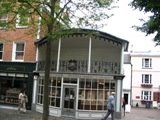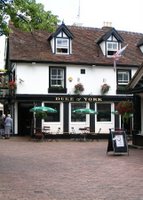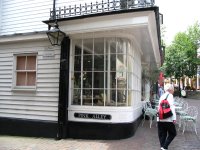A: Needless to say I am very glad you asked that, because I looked it up. Apparently, and I had this from the very best of sources, my dear (she says in a low voice behind her fan), in 1698 the Duke of Gloucester fell on the slippery ground near the Springs and Princess Anne – later Queen Anne, gave One Hundred Pounds to pave the Walks with pantiles, which are small clay tiles. These tiles were laid on the Upper and Lower Walks to allow the rich and famous to walk in safety. Sad to say the Walks were repaved with flagstones in 1793. But for those intrepid researches who really need to see a small square tile, you can do so at the Tunbridge Wells Museum.
I should also note that because the weather in England in summer is not always fair and dry, (talk about state the obvious) the Pantiles were lined with covered colonnades, so the ladies and gentlemen could take the waters, promenade and stay dry.
At the corner of the Lower Walk sits the Musick Gallery, from where musicians would have entertained the strolling gentry.
 It was moved from the edge of the Upper Walk to its present location in th 1850’s. It’s beautiful bowfront lower window and curved balcony are quite charming.
It was moved from the edge of the Upper Walk to its present location in th 1850’s. It’s beautiful bowfront lower window and curved balcony are quite charming. We had a nice lunch at the Duke of York, pictured here. A pint of local brew and fish and chips.
We had a nice lunch at the Duke of York, pictured here. A pint of local brew and fish and chips.Another fabulous old building to be viewed while walking in the Pantiles. And the name of the little street, Pink Alley, isn't that a wonderful name?

Q: Was that it for entertainment.? Walking back and forth in front of the springs listening to Music?
A: Ah my dear, remember the old days where simple pleasures satisfied all? Royal Tunbridge Wells was much like any watering place in summer in England during the Regency. People went to Assemblies which were by subscription; they entertained each other in their summer homes and they played cricket on the common. There was also a nearby race course – horses that is.
I should mention, that by the time of the Regency, the really fashionable people did not go to Tunbridge Wells. Most of ton went to Brighton or Bath. But the Town still had it’s aficionados and hence my heroine ended up there for one night.
The information in these two is far more than I needed to know for my novel, but I must say that I enjoyed the visit.
There are also a great many interesting places to be found nearby Tunbridge Wells. If you’ve a fancy for castles there are two or three, there’s the ruins of a medieval Abbey, and a multitude of estate homes and picturesque villages.
I hope you will join me in a ramble around some of them over the next few months.
No comments:
Post a Comment